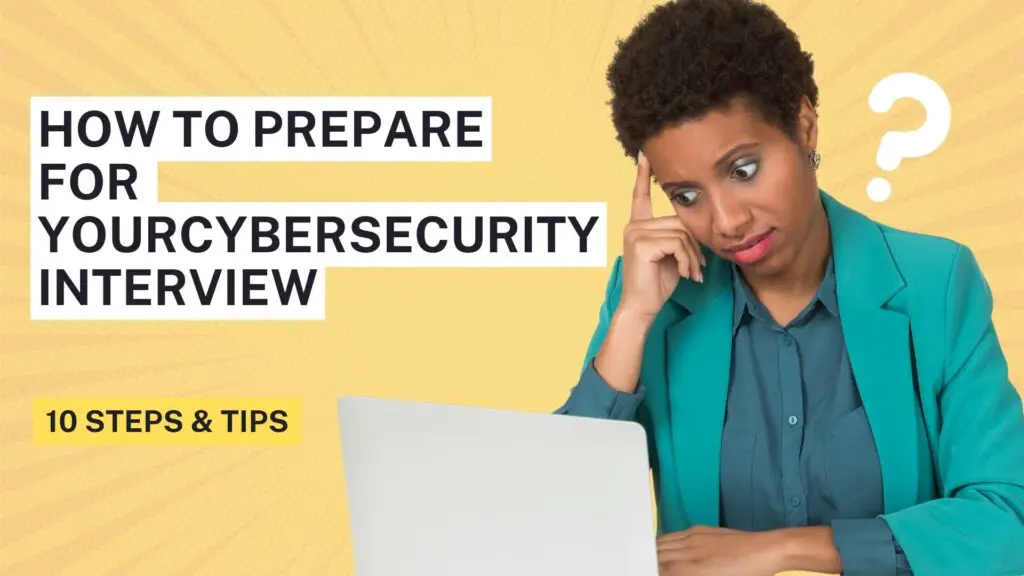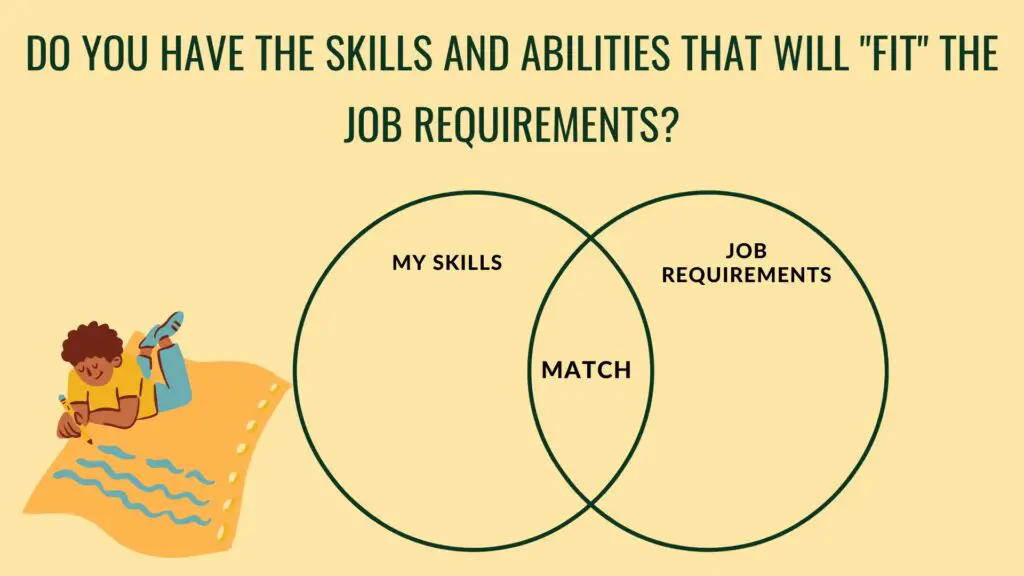"An interview isn't something that's done to you; it’s something you participate in," says RF Viering. "You must prepare for it if you hope to be successful." In general, here's how to prepare for your cybersecurity interview:
Research the company and job
Make a match
Note questions
Practice areas of likely questioning
Prepare your mindset
Prepare your appearance
Know your location
Ace the interview
Take notes after the interview
Follow up
Do you have a cybersecurity job interview coming up? Congratulations! Proper preparation can make all the difference. Start by researching and gathering information as much as you can about the company and job.

Step 1: Research The Company and Job You Are Interviewing For
Always start preparing for an interview by learning as much as you can about the company and the cybersecurity role you're going for.
When researching, you are looking for the following main points:
What are the organization's stated goals and values, or mission statements, if they exist? How would you explain what kind of company or organization this is?
Could you describe the culture of the organization? What do they believe, and how do they run things?
The job's unique demands and day-to-day responsibilities
This information will help you figure out if what the company is looking for and what you have to offer are a good match.
Now, when you are researching, it is important to get information from accurate sources. Here are several sources you can look for:
| Methods of Getting Information | Examples |
| Social | (a) Talking to family, or friends to see if they knew anything about the company or the job(b) Reaching out to a contact within the organization for more information;(c)Talking with people in similar jobs |
| Background | (a) Using print media (magazines, newspapers, websites), social media (LinkedIn), and other sources to learn more about the company and its industry(b) Read company releases (e.g., annual reports, financial statements, etc.). |

Step 2: Make A Match
Any cybersecurity job interview is just a conversation about whether there is going to be a perfect match all the way around.
In step one, you gathered information about the needs of the company doing the hiring. You must now assess whether you have the skills and abilities that will "fit" the job requirements.
You must think about the job thoroughly, imagine yourself doing it, and then look ahead to envision:
What will be expected of you? What will you do when you start work?
What are the three most important things you believe you should do when you first start?
Where do you see this job going in the long run?
If you can show that you can "own" this job and take care of the part of the business it concerns, you will be seen as a very valuable addition to the organization.
So, make a list of how your skills and experiences match what the company wants.
During your cyber security interview, the potential employer will want to know how you can help them get from point A to point B. You should show how you can meet the organization's needs.

Step 3: Note the Questions You had While Researching
As you were researching the company, and job and gathering information in Step 1, you probably came across questions that you want to ask during the interview.
Make sure you write these questions down somewhere. This way, when it is your turn to ask questions at the end of the interview, you will have some great ones ready to go.

Step 4: Practice The Areas of Likely Questioning
Now that you know what the company is looking for in a candidate, you can start preparing answers to questions you are likely to be asked during the interview.
Employers in the cyber security field, like employers in any other field, want you to be able to come in, settle in, and get to work as quickly and easily as possible.
So, during the job interview, they will try to find out if you have both the hard skills and the soft skills needed for the job.
Most likely, you will be asked questions in the following areas:
Your technical skills
Your problem-solving abilities
Your ability to work on a team
Your ability to communicate
How do you handle stress and pressure
Questions about your experience working in cybersecurity

Step 5: Prepare Your Mindset
Candidates going on job interviews in cybersecurity often have a gloomy outlook since they have already anticipated the reasons why they might not do well. Some of the most common reasons for a negative state of mind are:
You haven't been tested at an interview in years
You've recently failed other interviews;
You're desperate to leave your current job;
You may be overly eager to get this job and thus be very concerned;
You assume you have nothing valuable to offer.
Regardless of what causes negative thoughts, it's necessary to change them.
Sports stars say mental preparation is key to winning. To ace your next cybersecurity job interview, adopt the correct mindset.
Here's how:
Visualize yourself as already having the job.
See the interview as an opportunity to learn more about the company and role.
Focus on what you can offer, not what you want to get out of the job.

Step 6: Prepare Your Appearance
Your appearance says a lot about you as a professional. First impressions matter, so you want to make sure you are sending the right message with your appearance.
When you are interviewing for a cybersecurity job, it is important to remember that you are representing yourself, and also the company you will be working for if you get the job.
With that in mind, here are some tips for what to wear:
Business casual is usually appropriate
Avoid anything too flashy or revealing
Make sure your clothes are clean and pressed
Wear closed-toed shoes
Step 7: Know Your Location
The night before your interview, double-check the address and make sure you know how to get there. If you can, do a practice run so you know exactly how long it will take to get there.
You don't want to be late for your interview, so it is important to plan and give yourself plenty of time.
Step 8: Ace the Interview
It's interview day. Remember that the only reason the employer asked you to come in for an interview is to find out more about you and decide if you are the best person for the job.
Employers base their judgment on three aspects related to the cybersecurity job
Your cybersecurity qualifications and skills – what you know and what you can do;
Your experience and work background in cybersecurity – where you have been and what you have done;
Your personality and character – who you are and how you behave.
There are several things you can do to ensure that you present your best self on the day of the interview. Here are some helpful tips and mistakes to avoid:
| Tips | Mistakes To Avoid |
| Arrive on time | Not seeming to understand the requirements of the job properly. |
| Look smart | Overly focused on what they can get from the job rather than what they can contribute. |
| Don’t get frightened. Allow your interest in the job to let your enthusiasm grow | Using pretentious language or jargon to sound too smart. |
| Have a positive attitude. | Badmouthing an ex-employer |
| Do give examples and details to back up the things you say about yourself. | Assume that the interviewer knows what you're talking about. Things that seem obvious to you might not be clear to others. |
Step 9: Take Notes After the Interview
Once the interview is over, it is a good idea to take some time to write down your thoughts.
This will help you to remember what was discussed during the interview and to reflect on your performance. Taking notes also allows you to go back and review the interviewer's questions and your answers. This can help prepare for future interviews or in identifying areas where you need to improve.

Step 10: Follow Up
After the interview, it is important to follow up with a thank-you email. This shows that you are interested in the job and appreciate the opportunity to interview.
It's also a great opportunity to reiterate your interest in the job and highlight some of your qualifications.
Always leave your cybersecurity interview on a positive note. If you don't get the job, your name could be passed on to other potential employers, so you want to make sure you leave a good impression.
Following these steps can help you prepare for your cybersecurity job interview and increase your chances of getting the job. Good luck!